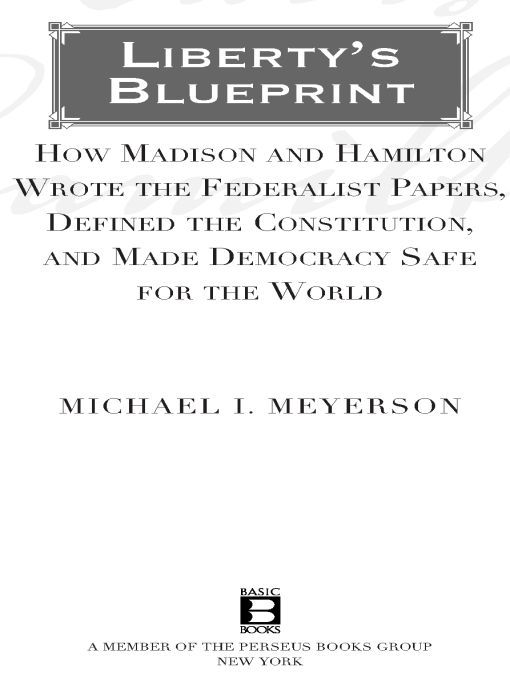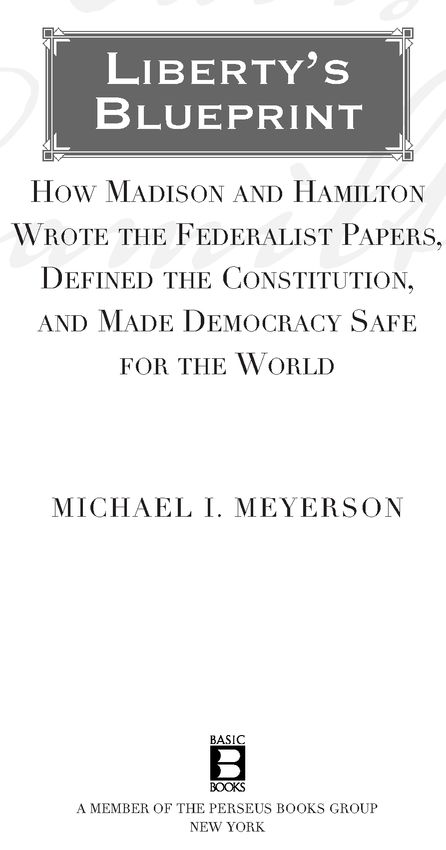Table of Contents
praise for
LIBERTYS BLUEPRINT
Meyerson has written a readable book.... Highly recommended.
Choice Magazine
A lively account of one of the key touchstones our courts rely upon to construe the Constitutionthe Federalist Papers.... Having read this engaging work, were likely to view the debates over the intent of the Constitutions drafters in a fresh light and even more so to admire the product of these patriots labors.
Shelf Awareness
Extraordinarily well written and engrossing... merits the attention of all who are interested in the birth of our democracy.
Federal Lawyer
This beautifully written book vividly describes how the Federalist Papers were written and why they are profoundly relevant for the constitutional issues of our times.... Meyerson has written a book that all students of the Constitution and American history will enjoy and learn from.
ERWIN CHEMERINSKY, Alston & Bird Professor of Law and Political Science, Duke University
Meyerson... combines the engaging story behind the writing of the Federalist Papers with a pointed analysis of their modern applicability.
Legal Times
Meyerson portrays the eras roiling debates over ratification, including the ultimately successful clamor for a Bill of Rights, and examines the essays modern-day relevance, particularly in terms of current Supreme Court arguments between originalists and non-originalists. A useful study of the Founders noble minds and fallible ideas.
Kirkus
Libertys Blueprint is a biography of a great book, the past, present and future of the Federalist Papershow they were written, how they were read, and what we can use in the twenty-first century.
RICHARD BROOKHISER, author of What Would the Founders Do? and George Washington on Leadership
To Lesly, William, and Andrew.
With Love.
PREFACE
One of the joys of teaching constitutional law is that every year I have the opportunity to introduce a new group of students to The Federalist. This collection of essays, written in 1787 and 1788 by Alexander Hamilton and James Madison (with a small assist from John Jay), was originally designed as a propaganda piece to influence the debate over ratification of the Constitution. For a modern audience, however, reading The Federalist is like having a private meeting with the savviest political and legal minds America has ever produced. The Federalist not only serves as the single most important resource for interpreting the Constitution, it provides a wise and sophisticated explanation for the uses and abuses of governmental power from Washington to Baghdad.
The Federalist was written in an extraordinary time. Just a few years after the Revolutionary War officially ended, Americans had to decide whether to accept or reject the radically new form of government devised in Philadelphia. In one sense, the battle over ratification of the Constitution can be seen as the first bare-knuckled political fight in American history. Each side suspected (with good reason) that its letters were being read, if not stolen, by postal carriers loyal to its opponents. Personal attacks and clandestine maneuvering were commonplace. Deals were struck. Promises were broken.
Yet the ratification conflict was also waged on an intellectual plane that is difficult to imagine today. Wise and educated men, many of whom were heroes of the revolution, wrote voluminously on the merits and weaknesses of this new plan of government. Both those in favor of the proposed Constitution and those opposing it believed that logic, reason, and a clear understanding of history would illuminate the discourse and lead to a proper conclusion. By far, the greatest exemplar of rational political debate was The Federalist.
Hamilton and Madison each expended considerable energy, physical as well as intellectual, in their struggle to secure ratification of the Constitution. In a period of seven months, from October 27, 1787, to May 28, 1788, they produced 175,000 words, explaining in detail the plan for this new form of government and expounding a sophisticated and enduring political philosophy. While it must be said that some of these papers are a bit ponderous and repetitious, and that those describing the weaknesses of the Articles of Confederation have little, if any, relevance today, the best of the Federalist papers are breathtaking in their brilliance.
When Thomas Jefferson recommended that The Federalist be required reading for students at the University of Virginia, he termed it an authority to which appeal is habitually made by all... as evidence of the general opinion of those who framed, and of those who accepted the Constitution of the United States, on questions as to its genuine meaning. In 1821, Chief Justice John Marshall wrote that The Federalist was a complete commentary on our Constitution, and is appealed to by all parties.
Both Madison and Hamilton understood that a constitution is greater than the sum of its parts. The proposed Constitution represented a radical shift in the nature of government, and they recognized the need to provide the rationale for such a markedly different governmental system. Thus The Federalist contains a wide array of insights on politicians, human nature, democracy, greed, and poweran array of such astuteness that Theodore Roosevelt would praise it as on the whole the greatest book dealing with applied politics that there has ever been.
Unfortunately, much of the wisdom of The Federalist has been distorted by time. Many of the essays have been misread and misinterpreted. The essays are best approached with an equal appreciation of law and history. I am not a professional historian, and, as a law professor, I greatly respect the skill and discipline that historians bring to their craft. By building on their work, and conducting my own research, I have been able to arrive at a new understanding of the story and meaning of Madisons and Hamiltons astonishing creation.
But to do this requires viewing their work in its entirety, comprehending the context of each essay, and paying close attention to the arguments of the Anti-Federalists that they were trying to answer. The first goal of Libertys Blueprint is to present the most important teachings of The Federalist to a modern audience.
It is remarkable how The Federalists analysis of the separation of powers between the president and Congress can illuminate our understanding of those same issues as they recur in the debate over Iraq or the war on terrorism. The dividing line between the federal and state governments that Madison and Hamilton labored to explicate can be seen at the heart of contemporary battles over such diverse issues as the Clean Air Act and medical marijuana. There is also much we can gain from rediscovering The Federalists observation that all power can be abused, no matter how virtuous those who are wielding it may be.
One obstacle to appreciating the wisdom of The Federalist is the ongoing, and increasingly heated, disagreement over whether we should rely on what is called the original understanding of those who drafted and ratified the Constitution in interpreting the document today. Those who call themselves originalists claim that basing our interpretation of the Constitution on such an historical understanding is the only way to stay faithful to the concept of a written constitution and the only mechanism for preventing judges from deciding cases based on their personal preferences instead of on legal principles. Opponents of the originalist approach warn that by restricting ourselves to a centuries-old interpretation of constitutional phrases such as freedom of speech or equal protection of the law, we are forcing society to return to a legal system which jailed those who criticized the government, imprisoned interracial couples attempting to marry, and treated women as too weak and emotional to serve as lawyers.



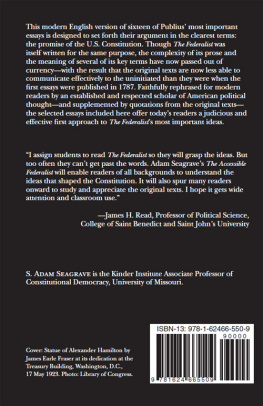
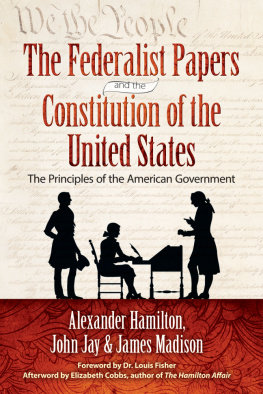
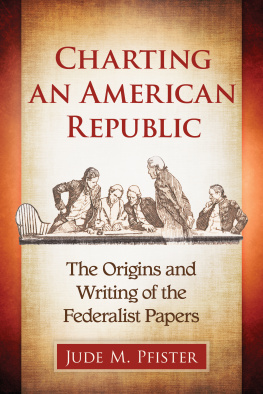
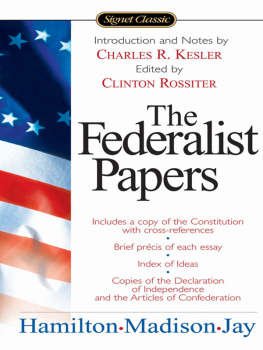
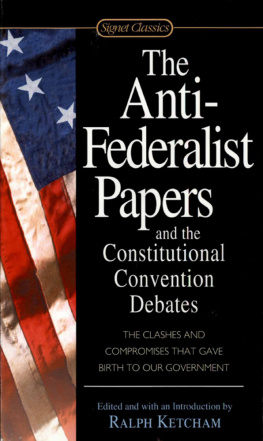
![Jay John - The Federalist : a collection of essays, written in favour of the new Constitution, as agreed upon by the Federal Convention, September 17, 1787. : In two volumes. Vol. I[-II.]](/uploads/posts/book/76130/thumbs/jay-john-the-federalist-a-collection-of-essays.jpg)


